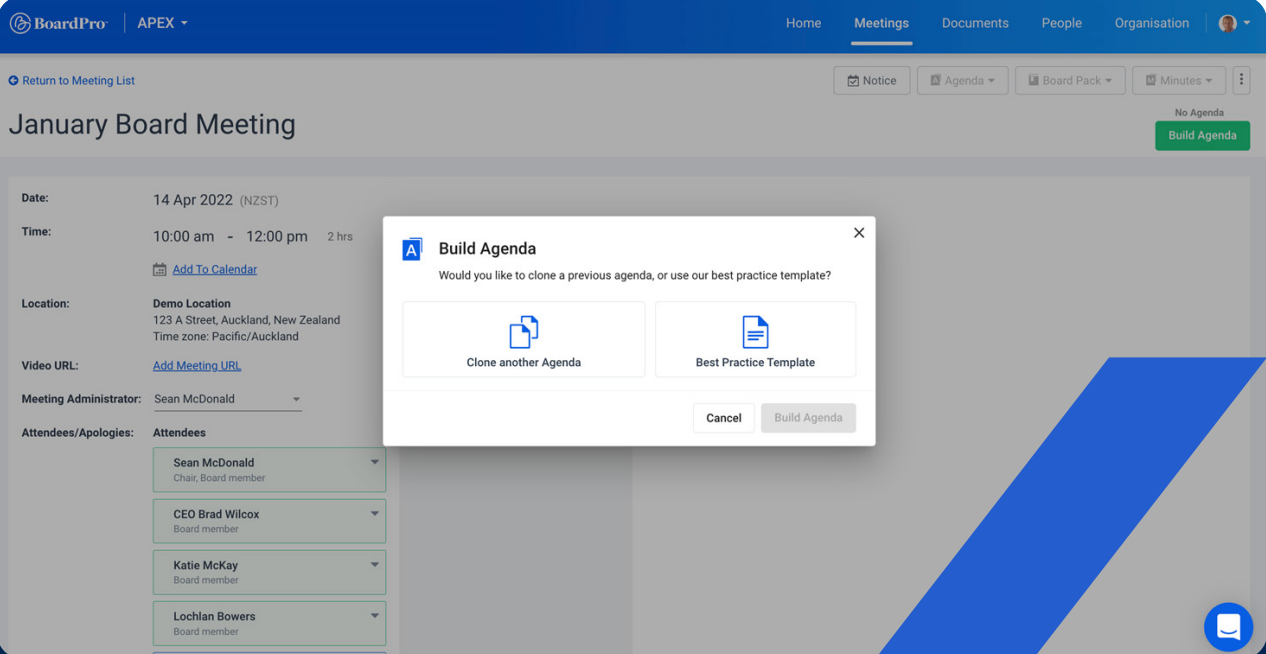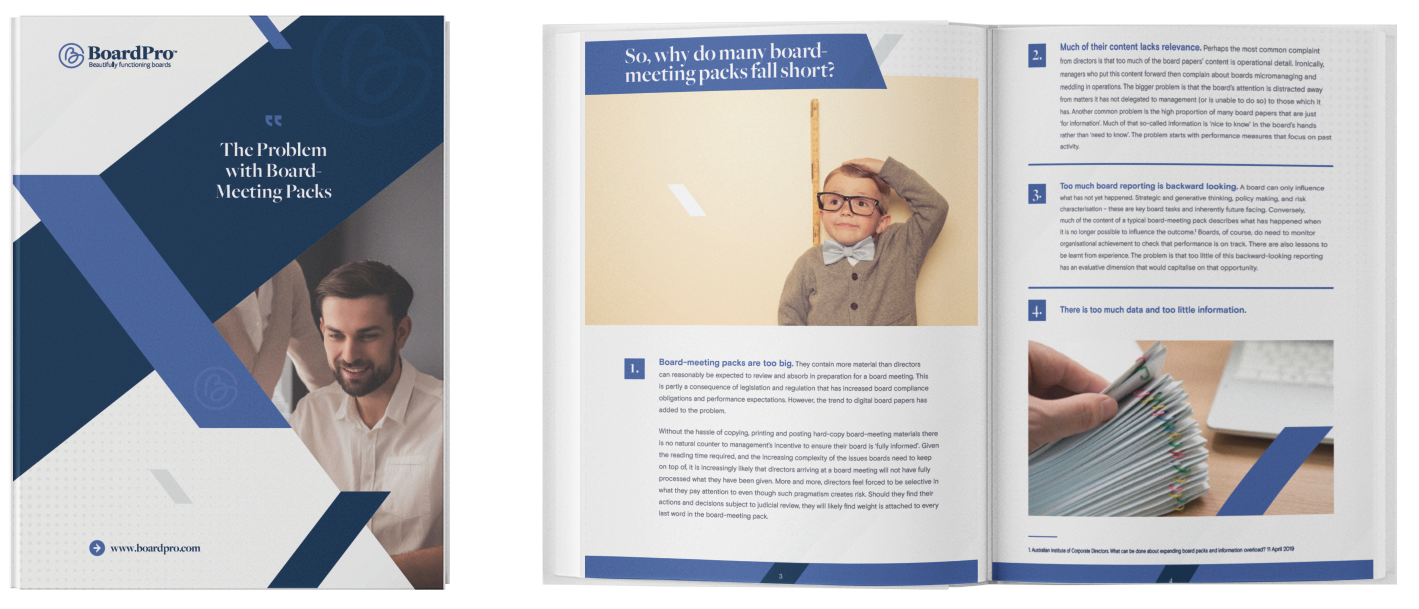The problem with board packs and what to do about them
Have you ever been preparing for a board meeting, skimming through the board pack only to find out a portion of the material is irrelevant to the meeting?
You’re not the only one. A recent study into governance found that 64% of boards had to work with board packs that didn’t support focused conversations or priority issues.
To run effective and efficient board meetings, it's essential to have board packs that are comprehensive and contain the right documents and reports.
One of the most common issues arising from board packs is a lack of clarity over materiality. In other terms: Why is this in front of me, and why does it matter to the board?
How do you shape your board packs so they give enough focus and context?
“For each agenda item, ensure the 'why' is answered in the first line. This can be succinctly summarised in bullet points. An effective chair should be the gatekeeper/triage of where the focus of the board lies and provide the context for the same. Keep the agenda to a maximum of 12-15 items but allow enough time for robust discussion of the items requiring decision. Another important aspect is ensuring board members are inducted and trained where they understand their governance role and responsibilities”

Managing Director, HSG
What are the common issues with board packs?
Board packs are too big: They contain more material than directors can reasonably be expected to review and absorb in preparation for a board meeting. This is partly a consequence of legislation and regulation that has increased board compliance obligations and performance expectations. However, the trend to digital board papers has added to the problem.Without the hassle of copying, printing and posting hard-copy board-meeting materials there is no natural counter to management’s incentive to ensure their board is ‘fully informed’. Given the reading time required, and the increasing complexity of the issues boards need to keep on top of, it is increasingly likely that directors arriving at a board meeting will not have fully processed what they have been given. More and more, directors feel forced to be selective in what they pay attention to even though such pragmatism creates risk. Should they find their actions and decisions subject to judicial review, they will likely find weight is attached to every last word in the board-meeting pack.
The content lacks relevance: Perhaps the most common complaint from directors is that too much of the board papers’ content is operational detail. Ironically, managers who put this content forward then complain about boards micromanaging and meddling in operations. The bigger problem is that the board’s attention is distracted away from matters it has not delegated to management (or is unable to do so) to those which it has. Another common problem is the high proportion of many board papers that are just ‘for information’. Much of that so-called information is ‘nice to know’ in the board’s hands rather than ‘need to know’. The problem starts with performance measures that focus on past activity.
Board reports look backward instead of to the future: A board can only influence what has not yet happened. Strategic and generative thinking, policy making, and risk characterisation – these are key board tasks and inherently future facing. Conversely, much of the content of a typical board-meeting pack describes what has happened when it is no longer possible to influence the outcome. Boards, of course, do need to monitor organisational achievement to check that performance is on track. There are also lessons to be learnt from experience. The problem is that too little of this backward-looking reporting has an evaluative dimension that would capitalise on that opportunity.
There is too much data and too little information: It is frustrating for directors to be faced with a ‘data dump’ with precious little analysis and insight. The absence of an explanation of the relevance and implications of what management is putting in front of the board forces directors to pose a whole raft of questions that should not be necessary. For example, ‘Why are you giving us this? What do you think that data is telling us? What are its implications? What options does it open up for us? What threats does it suggest are on the horizon? What are the assumptions on which this recommendation is based?’
The purpose of a board report is not clear: As they review the content of the board papers ahead of a meeting, directors often find themselves puzzling about the purpose of a report or proposal. Without a pointer to the reason a document is in the board-meeting pack there is no clear starting point for their preparation. If there is no recommendation at the head of the paper, the action expected of the board is not clear. Also, there is often no context offered that would explain where the paper is kicking off from (e.g. a policy or past decision) and why the issue has a level of materiality that justifies the board’s attention.
Board papers are poorly written: We can include a number of shortcomings here. For example, too many board papers do not tell a story. They lack a narrative structure that derives from a problem definition to an analysis, to a review of options, and finally a conclusion and recommendation. There is a wide but mistaken belief that presenting board papers as a series of bullet points will somehow make the paper shorter and easier to understand. Neuroscience tells us the opposite is more likely. It is also common to see technical language, jargon and acronyms that make the material impenetrable to many members of the board. Excessive use of unexplained adjectives (‘strategic’, ‘strong’, ‘promising’, etc.) that are likely to mean different things to different people in the meeting is another problem.
The content of the board pack is poorly presented: Inconsistent formatting reflecting the preferences and idiosyncrasies of individual authors makes progress through a board-meeting pack more difficult. We see small-font content squashed onto the page with few headings to expose structure and too little white space to break it up. This might marginally reduce the number of pages but greatly increases reading difficulty. Documents conceived in paper form often do not transfer well to small tablet screens (spreadsheets especially). The trend in some organisations to dress board papers up with infographics and garish colours detracts from rather than enhances understanding. Inadequate indexing and pagination make it difficult – particularly in digital form - to navigate through the pack. Basic proofreading errors are not only a distraction but reduce confidence in the content and the author.
How do you reduce your board papers down to a readable size?
“We ensure that we provide a considered board briefing paper and ensure that the key issues provide detail around why the Board is receiving the paper (i.e. delegations, strategy, discussion for future direction). We also include links where possible and utilise the Governance documents section of BoardPro to place key documents that require reference”

Board Secretary, HSSO
The implications of these common issues are far-reaching, not only in the board room, but also across the wider organisation. These issues include:
- Board meeting time is not being put to its most productive use. Too much of a board meeting has to be spent trying to identify what the main issues are (if any) for discussion and decision.
- To the extent directors are engaging with their board-meeting packs, they are likely skipping over much of the content either because of excessive length or the ‘indigestibility’ of what’s presented. They are at risk of missing the key points.
- Boards are not having the right conversations – at best they are spectators to management activity (after the fact) at the expense of delivering to the effective direction and control of their organisations. Effective boards work ‘on’ the business not ‘in’ the business.
- The reason board-meeting packs are widely panned as unfit for purpose underlines a major board performance problem. However, rather than is usually the case - blaming management for board paper deficiencies - boards should be looking to their own culpability. We will pursue that idea later in this paper and offer some ideas on how the shortcomings of board-meeting packs can be rectified.
Why are good board packs essential?
Like many individuals in their day-to-day lives, directors and board members can become overly optimistic about what they can achieve in a given time frame.
Governance theorist John Carver said in his book, Strategies for Board Leadership, “most of what boards do either does not need to be done or is a waste of time when the board does it. Conversely, most of what boards need to do for strategic leadership is not done”.
With the minimal time that boards have to spend on reviewing board packs, it is crucial that they invest their precious time on what is efficient and on conversations that matter.
In any report, whilst it’s important that relevant metrics are acknowledged and discussed, future focused board packs are essential to keep the board looking forward strategically.
How do you focus the board pack on future discussions and actions?
“A Board pack should be a summary of the current and a focus on the future. The focus on the future, is the value being created and the actions occurring in the business, now and into the future to deliver the future value. In these times of uncertainty the future needs to be planned and prepared for on a worst case, predicted and best case perspective”

CEO, Governance co.
How do I create an effective board pack?
We’ve described above a series of common concerns directors express about shortcomings in board meeting packs. While directors are expected to use their initiative to access other relevant sources of information, the board-meeting pack is the single most important channel for the information most boards rely on. To be effective, therefore, boards need meeting packs that contain relevant and reliable information, available when they need it, and in sufficient quantity. They also need it in a form they can engage with efficiently and still emerge with the level of understanding they require.
But management has a part to play too. So, where do you start?
Improve board alignment and discipline
Management operates under authority delegated by the board. Consequently, to a considerable extent the board must do its job first. It must express itself clearly to management about what it needs to know to discharge its core responsibility to direct and control the organisation. The content of board papers - including their format, timeliness and length - are, therefore, matters on which the board should set expectations and provide direction to management on what is required.
Often the problem with overloaded board packs and excessively lengthy board papers is that directors have never systematically considered and agreed what information the board needs. On top of that, boards tend to treat management time as a ‘free good’. They are often too quick to ask management for additional information without questioning (or being questioned) whether the result will be worth the resource required. Board requests to management for more information are often no more than a tactic to move a meeting on or to indulge a particular director’s hobby horse.
Boards also need to agree on performance metrics that are relevant at the board level. These should flow easily from the kind of high-level statement of purpose and strategic outcomes that are fundamental to the board’s fulfilment of its direction-giving responsibility.
Work to a brief
A great deal of time and trouble would be saved if those tasked with preparing board papers were given a clear brief. What needs to be made clear, in particular, is the purpose of each paper and the specific questions that need to be answered. For example, in a decision paper, what are the key decision-making criteria that must be satisfied?
This basic specification should apply no matter where it is initiated. It might seem an extra and even unnecessary step, but it saves a lot of time and unnecessary frustration in the end - not least because it reduces the risk that the resultant documents will have significant gaps or be overloaded with irrelevant material.
An important aspect of defining the brief is to set realistic expectations about timing. Some board requests justify urgency, but many do not. Deadlines can and should be negotiated. This is not usually a problem with important decision papers and routine monitoring reports but ad hoc requests for additional information are often problematic. With these, executives are often their own worst enemy – too readily agreeing in the heat of a board meeting to supply extra material without thought to the availability of preparation time or the opportunity costs to other commitments.
Insist that all documents prepared for the board follow a template
Many board-meeting packs seem like the proverbial ‘dog’s breakfast’ as a result of leaving the choice of structure, format and all the other variables to each writer. Consequently, whether a board paper is easily digestible by, or even useful for, its intended audience can be a bit of a lottery.
BoardPro’s default board agenda template is a good starting point as it structures the pack from the most to least critical matters in a format that is easy to comprehend.

It should be a requirement that anyone preparing a board paper, for whatever purpose, follows an appropriate organisation-wide template. A predetermined structure and a well-designed format help writers improve the quality of their content.
Consistency of construction and presentation of documents not only makes them look more professional but makes it easier for directors to read and absorb their content as well.
Templates also help ensure board papers have a proper narrative structure with, like any good story, a beginning, a middle and an end, and a logical flow between each. Despite some board’s misplaced enthusiasm for papers drafted in bullet points, a narrative form is necessary to force writers to explain themselves properly and to enhance the reader’s understanding and retention.
Boards everywhere are looking to board-meeting pack content to prioritise analysis and insight over data and to help lift the board’s attention into the future-facing, strategic realm.
Templates help ensure that essential content is not missed out. Key questions can be included in templates offering the kind of checklist benefit found worthwhile in other high-pressure decision-making environments.
Train your staff how to support the board
Governance training tends to focus on the board and its members but many of the shortcomings in board papers are the result of the staff supporting the board not understanding the board’s role and what directors need to enable them to do their job. Those staff preparing materials for the board – from the chief executive down - need to understand their ‘customer’s’ perspective and requirements. Sadly, many of them also need to be taught how to express themselves in ‘plain English’.
There are some fundamentals that contributors to board-meeting packs need to understand. For example:
- Board papers are not where writers show off how much they know. Board papers need to present as concisely as possible a clear problem definition, objective analysis, and valid evidence, so the board can reach a conclusion and make a decision.
- Board papers need to be honest about where, for example, things are falling short of plan. Directors become very suspicious about what is being hidden when faced with a board meeting pack that is little more than a highlights package. The board papers should signpost anything that is likely to be of concern to the board.
- Directors are easily distracted by clumsy and error ridden writing (spelling mistakes, grammatical errors, wordiness, etc.) and are likely to judge the content the writer is trying to convey as similarly suspect.
- Board meetings are expensive to convene even if only terms of people’s time. Ideally, therefore, what is put to a board meeting should demand action by the board. Writers should ask themselves ‘if this were the only item on the agenda would it still justify the board meeting?’ Unfortunately, as a basis for stimulating and value-adding board meeting dialogue the content of many board-meeting packs is a signal to directors to review their emails.
Balance the content's presentation
Board papers that are either word or data dense are likely to achieve less than the purpose for which they are prepared.
Financial reports, for example, tend to be data driven but they still need commentary to interpret and explain the significance of the data and offer analysis and insight. Most financial reports could considerably improve the reader’s experience by converting data points into relevant ratios and then into graphs that tell the story of the financial condition of the organisation at a glance.
Where is it now, where has it come from and where might it be going (projections)? Directors should not have to undertake an almost forensic analysis of the numbers as part of their board meeting prep any more than they would be expected to delve into the chemical notation of, say, a manufacturing process. What the numbers mean and where they might be leading should be discussed but supported by a management-provided analysis to initial such discussion. Historical accounting measures are not the only way to judge organisational performance. Non-financial measures are increasingly acknowledged as central to understanding organisational performance and well-being.
Word-dense papers can be improved considerably with visuals of various kinds too. Photos, graphs, illustrations and hyperlinks to short videos can immediately improve the reader’s understanding of the activity or assets referred to. The aim is to inform and educate, and to illustrate key points in the text.
Another balance that needs to be struck is between backward- and forward-facing performance indicators. Boards need ‘leading’ as well as the more traditional lagging indicators.
Condense drafts—not just once, but twice
The often-quoted Australian court case in 2011 concerning the collapse of a company called ‘Centro’ reportedly revolved around two key pages in a board-meeting pack running to almost 1,200 pages. The judge was unequivocal about two things. Firstly, if critical information were missed because of an overload problem, the board could have prevented it. Secondly, no matter what the volume is of material provided to directors, they need to take the time to read and understand it.
Depending on a director’s reading speed, it might be realistic to expect that an ‘average’ director preparing for a meeting can cover about 30 pages in an hour. It is easy to do the sums and the message is clear: board-meeting packs need to be reduced in size.
Outside of (and in addition to a ruthless culling of the board meeting agenda, how can this be achieved?
- Be prescriptive about the maximum length of board papers. Whatever size is chosen will be arbitrary to some extent, but 10 pages should be more than enough for most topics.
- Eliminate content that is just ‘nice to know’ – and make it available in another form at another time in a location accessible by directors who are interested. Directors need to understand that what is in the board-meeting pack is ‘need to know’ down to the last word.
- In performance monitoring, use exception reporting. Only report that which is outside an acceptable range of variance determined by the board (e.g. ±5%).
- Have the board agree the frequency for which each metric needs to be reported. Many performance indicators change little from one meeting cycle to the next. Look at these two or three times a year and in the meantime do not pad out reports with content that has no informational value.
Summarise the content of each document
Every board paper longer than, say, two pages should be preceded by an executive summary no longer than one page. An executive summary should cover:
- the purpose of the paper
- the context and substance of the matter
- the main issues/questions addressed
- the conclusions
- the recommendations (i.e. the board action proposed)
This discipline should also be applied to the kind of documents presented from outside sources (e.g. industry publications, sector analyses, consultants’ reports) that are usually included in the board meeting pack without any guidance to directors as to their relevance to the board’s interests, key conclusions, points to note, etc.
Forcing the prior preparation of a cover note would greatly reduce the number of these documents added to the board papers. Better still it would force a proper board paper to be prepared on the significance of such a document if it were in the ‘need to know’ category.
Include a quality control
Chief executives should be clear that they are accountable for everything in the board-meeting pack. They have implicitly approved all the content even if they have not authored it themselves. Boards should reinforce that.
Where resources are available it is desirable to nominate someone as the quality controller of board meeting packs. The board secretary or company secretary are obvious candidates. The quality-control role is to ensure that material supplied for the board-meeting pack is ready to be distributed to board members; in other words, that it:
- relates to an item in the most up-to-date version of the agenda
- is on schedule and will allow board members adequate preparation time
- fulfils the brief
- is template compliant
- is free of obvious writing errors
Another aspect of the quality check is for completeness. A good test for this is whether a paper or report still needs to be ‘presented’ or can be ‘taken as read’. Ideally all material in a board-meeting pack should be self-explanatory and, apart from any necessary verbal updates, require no further introduction at the meeting. This allows valuable board meeting time to be used for questions, discussion and deliberation.
Ideally there would also be an in-house peer review requirement and perhaps even the scrutiny of a separate editor. At the very least, all writers should be expected to use one of the readily available online editing tools like, for example, Grammarly.
Include a board pack road map
Directors benefit greatly from a short document that offers a guide to the coming meeting and the materials that are provided to support it. It is a great aid to directors’ preparation because it offers a holistic view of the meeting. Rather than just a series of separate items on an agenda, it is a steer on the main focus of the meeting, its relevance to the board’s priorities and the decisions that need to be made. It helps each director to think about where they can and should add value. It means that instead of starting their review at the beginning of the board-meeting pack and working laboriously through to the end, each director can go straight to the parts to which they need to pay the greatest attention.
Ideally this overview or ‘roadmap’ is prepared by the chair because it is an opportunity for the board leader to signal to colleagues what the meeting must achieve, where its focus must lie and how, consequently, the meeting needs to be conducted. However, we have also seen very good examples prepared by chief executives either separate from or as part of their ‘Chief Executive Officer’s Report’.
Download a copy of the guide here.
When you're ready here's how BoardPro can help
Start a Free Trial — run a whole board meeting cycle for free, no credit card needed. You’ll be able to create board packs in a click, and have all minutes, decisions, actions and interests in one place. Be more effective, save time, and have everyone on the same page! Book a Demo — see BoardPro in action in this 30-minute demo, and have all your questions answered by a BoardPro specialist. You’ll get an introduction to all of BoardPro’s features — see how to set an agenda, create board packs, and take minutes. Attend a Free Governance Webinar — learn from our community of governance experts on subjects such as strategy, understanding board dynamics, reporting, and running effective meetings. You’ll join hundreds of others in these engaging events covering the latest governance topics. Find a Governance Template — practical documents to make governance easy! Templates cover strategic planning, board evaluation, risk assessment, SWOT analysis, and many other essential governance and business topics to grow your organisation and adopt good governance practices. |
Share this
You May Also Like
These Related Stories

How to Build a Better Board Meeting Pack

There Is a Lot Wrong with Most Board Meeting Packs



